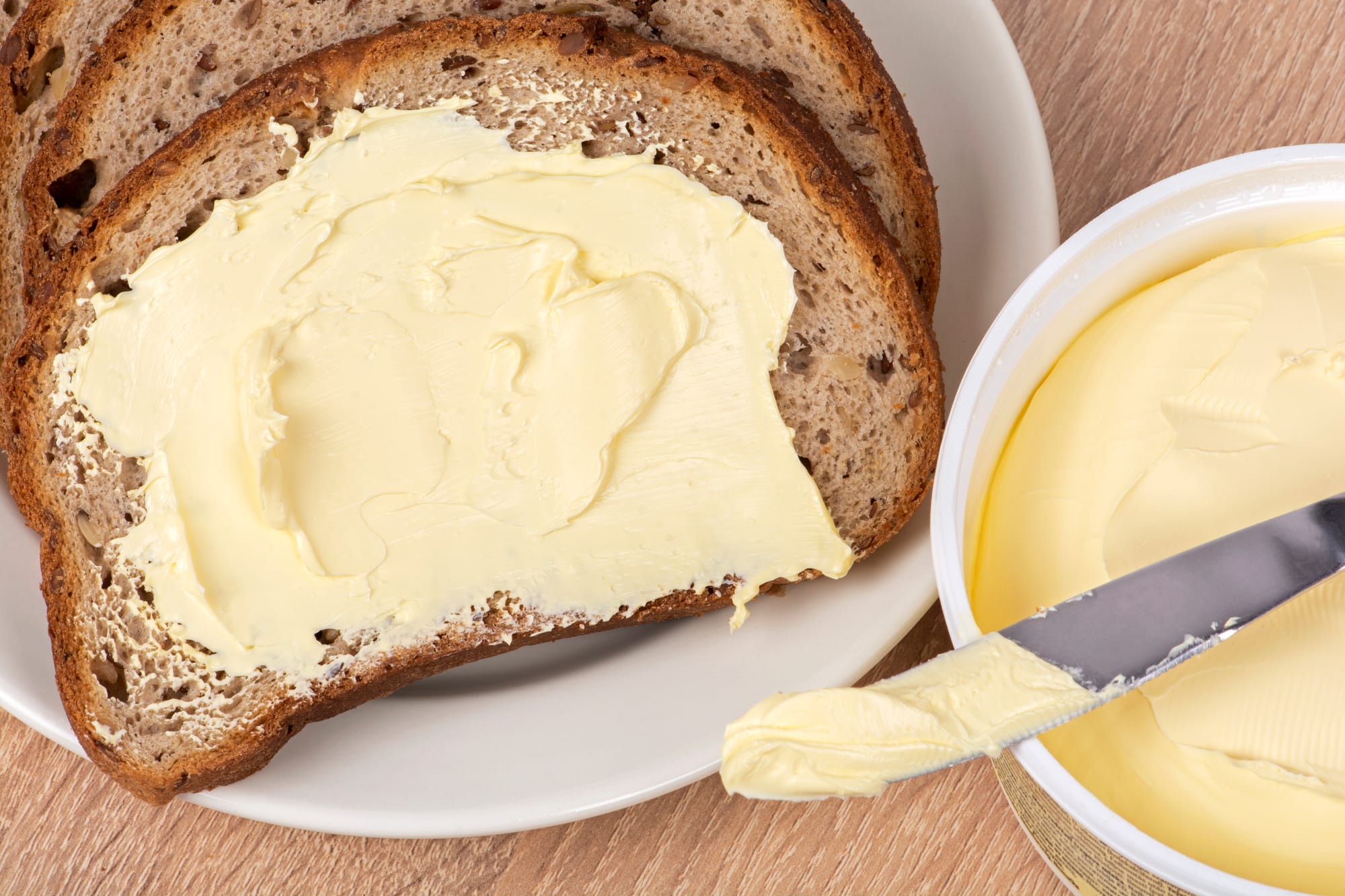Is Butter Bad for You? (Here’s What to Know About Its Cholesterol Effect)
Is butter bad for you? It's saturated fat, which means it raises your "bad" cholesterol levels and, in turn, heart disease risk ... right? Hmm.

OK, so I’ll admit: this is somewhat of a … personal topic.
Because I’ve recently gotten into baking (I know, I know — what was I doing during the COVID lockdown when everyone was doing no-equipment home workouts?!), and only JUST realized how much butter goes into my favorite bread, pastries, and cakes.
In hindsight, I feel a little foolish. I mean, how else would:
🎂 Buttercream be so, IDK how else to put it, but buttercreamy?
🥐 Croissants achieve their addictive flakiness?
*facepalm* So, while I was weighing out what seemed like wAaaAay too much butter for lemon curd, I couldn’t help but wonder:
“All this butter can’t be good for me, right?!”
Why is butter bad for you?
I know what you’re thinking, “Butter is fat, fat is flavor, and flavor is GOOD. So, why is butter bad for you again?”
Two words: saturated fat.
In the world of fats, there are 2 types:
Psst: many say seed oils increase your risk of developing heart disease, type 2 diabetes, and cancer. But is that true?

What’s the deal with saturated fats?
The main concern with saturated fats is their raising of low-density lipoprotein (LDL) levels.
What’s that? It’s a type of lipoprotein that carries cholesterol — a waxy, fat-like substance found in all body cells — through your blood vessels. The other lipoprotein you have is called high-density lipoprotein (HDL).
Interestingly, LDL and HDL also go by the following names:
- LDL = “bad” cholesterol
- HDL = “good” cholesterol
This is admittedly an overly simplistic way of framing the 2 lipoproteins, but it is somewhat justified since:
- The greater the number of LDL particles in the blood, the more likely some will pass into artery walls and kickstart plaque formation (clogged arteries could lead to heart attack and stroke)
- HDL “absorbs” cholesterol in the blood and transports it to the liver, which then clears it from the body (high levels of HDL could lower your risk for heart disease and stroke)
But … is butter truly bad for you?
So, here’s the thing. Unfortunately for me — and all butter enthusiasts — there is evidence that diets high in saturated fat from butter (in replacement of carbohydrates or unsaturated fatty acids*) increase LDL levels.
*Remember the words “in replacement of”; we’ll expand on this later.
However, fortunately, it appears there’s nearly no evidence supporting the notion that eating a diet high in saturated fat strongly increases the risk of developing heart disease or dying from it:
It’s all about overall diet quality and lifestyle
Let’s recap. The consumption of saturated fats (e.g., butter) increases LDL levels, but doesn’t increase the risk of developing heart disease or dying from it?
??? What gives?
The simple answer is that saturated fat intake is but a single piece of the heart disease puzzle.
Instead of singling out any one food group or nutrient, we need to consider a person’s overall diet quality and lifestyle:
- Where are they getting their saturated fats? In minimally processed animal-based foods, such as beef and eggs, or in ultra-processed foods, like ice cream and chips, which are incredibly calorie-dense and loaded with added sugars and sodium?
Btw, are eggs — a rich source of dietary cholesterol — good or bad for your blood cholesterol levels? Find the answer here:

- What do the saturated fats replace? For example, if I regularly swap out a serving of fruits and vegetables for butter chicken (made with a CRIMINAL amount of butter), my health would likely suffer.
- Are they living an otherwise healthy lifestyle? Do they engage in the recommended weekly amounts of cardio and strength training activities? How’s their sleep? Or stress levels?
Disclaimer: don’t gorge on saturated fats
Please, please, please, don’t take this article to mean, “Feel free to eat as much butter and saturated fat as you want!”
Yeah, don't do this:
No.
While the link between saturated fat intake and adverse cardiovascular health outcomes isn’t well-established, it’s probably still in your best interests to follow the American Heart Association’s recommendation of limiting your saturated fat intake to 5% to 6% of your daily calorie intake.
For a typical 2,000-calorie diet, that translates to a maximum of ~13 grams of saturated fat daily. Just so you know, 1 tablespoon of butter (14.2 grams) contains 7 grams of saturated fat.
(Yes, this means I’ll be CAREFULLY portioning my baked goods and/or gifting excess to lucky neighbors.)
OK, so to wrap things up, here’s the main takeaway: if you care about your heart, you should probably indulge in butter (and saturated fats) in moderation. But, in the same vein, it can’t be the only thing you focus on.
There’s also overall diet and lifestyle quality.
Want to get a big picture of your daily health habits? Why not track your workouts and food intake on GymStreak?
Here’s a sneak peek of this smart, AI-powered workout planner with nutrition tracking:
References
Cho, Yun Kyung, and Chang Hee Jung. “HDL-C and Cardiovascular Risk: You Don’t Need to Worry about Extremely High HDL-C Levels.” Journal of Lipid and Atherosclerosis, vol. 10, no. 1, Jan. 2021, p. 57. www.ncbi.nlm.nih.gov, https://doi.org/10.12997/jla.2021.10.1.57.
Chowdhury, Rajiv, et al. “Association of Dietary, Circulating, and Supplement Fatty Acids with Coronary Risk: A Systematic Review and Meta-Analysis.” Annals of Internal Medicine, vol. 160, no. 6, Mar. 2014, pp. 398–406. PubMed, https://doi.org/10.7326/M13-1788.
Huth, Peter J., and Keigan M. Park. “Influence of Dairy Product and Milk Fat Consumption on Cardiovascular Disease Risk: A Review of the Evidence.” Advances in Nutrition (Bethesda, Md.), vol. 3, no. 3, May 2012, pp. 266–85. PubMed, https://doi.org/10.3945/an.112.002030.
Jung, Eujene, et al. “Serum Cholesterol Levels and Risk of Cardiovascular Death: A Systematic Review and a Dose-Response Meta-Analysis of Prospective Cohort Studies.” International Journal of Environmental Research and Public Health, vol. 19, no. 14, July 2022, p. 8272. PubMed Central, https://doi.org/10.3390/ijerph19148272.
Li, Yanping, et al. “Saturated Fat as Compared With Unsaturated Fats and Sources of Carbohydrates in Relation to Risk of Coronary Heart Disease: A Prospective Cohort Study.” Journal of the American College of Cardiology, vol. 66, no. 14, Oct. 2015, pp. 1538–48. PubMed Central, https://doi.org/10.1016/j.jacc.2015.07.055.
Lusis, Aldons J. “Atherosclerosis.” Nature, vol. 407, no. 6801, Sept. 2000, p. 233. www.ncbi.nlm.nih.gov, https://doi.org/10.1038/35025203.
Mozaffarian, Dariush, et al. “Effects on Coronary Heart Disease of Increasing Polyunsaturated Fat in Place of Saturated Fat: A Systematic Review and Meta-Analysis of Randomized Controlled Trials.” PLoS Medicine, vol. 7, no. 3, Mar. 2010, p. e1000252. PubMed, https://doi.org/10.1371/journal.pmed.1000252.
Ramsden, Christopher E., et al. “N-6 Fatty Acid-Specific and Mixed Polyunsaturate Dietary Interventions Have Different Effects on CHD Risk: A Meta-Analysis of Randomised Controlled Trials.” The British Journal of Nutrition, vol. 104, no. 11, Dec. 2010, pp. 1586–600. PubMed, https://doi.org/10.1017/S0007114510004010.
“Saturated Fat.” Www.Heart.Org, https://www.heart.org/en/healthy-living/healthy-eating/eat-smart/fats/saturated-fats. Accessed 11 July 2024.
Siri-Tarino, Patty W., et al. “Meta-Analysis of Prospective Cohort Studies Evaluating the Association of Saturated Fat with Cardiovascular Disease.” The American Journal of Clinical Nutrition, vol. 91, no. 3, Mar. 2010, pp. 535–46. PubMed, https://doi.org/10.3945/ajcn.2009.27725.
Tabas, Ira, et al. “Subendothelial Lipoprotein Retention as the Initiating Process in Atherosclerosis: Update and Therapeutic Implications.” Circulation, vol. 116, no. 16, Oct. 2007, pp. 1832–44. PubMed, https://doi.org/10.1161/CIRCULATIONAHA.106.676890.


